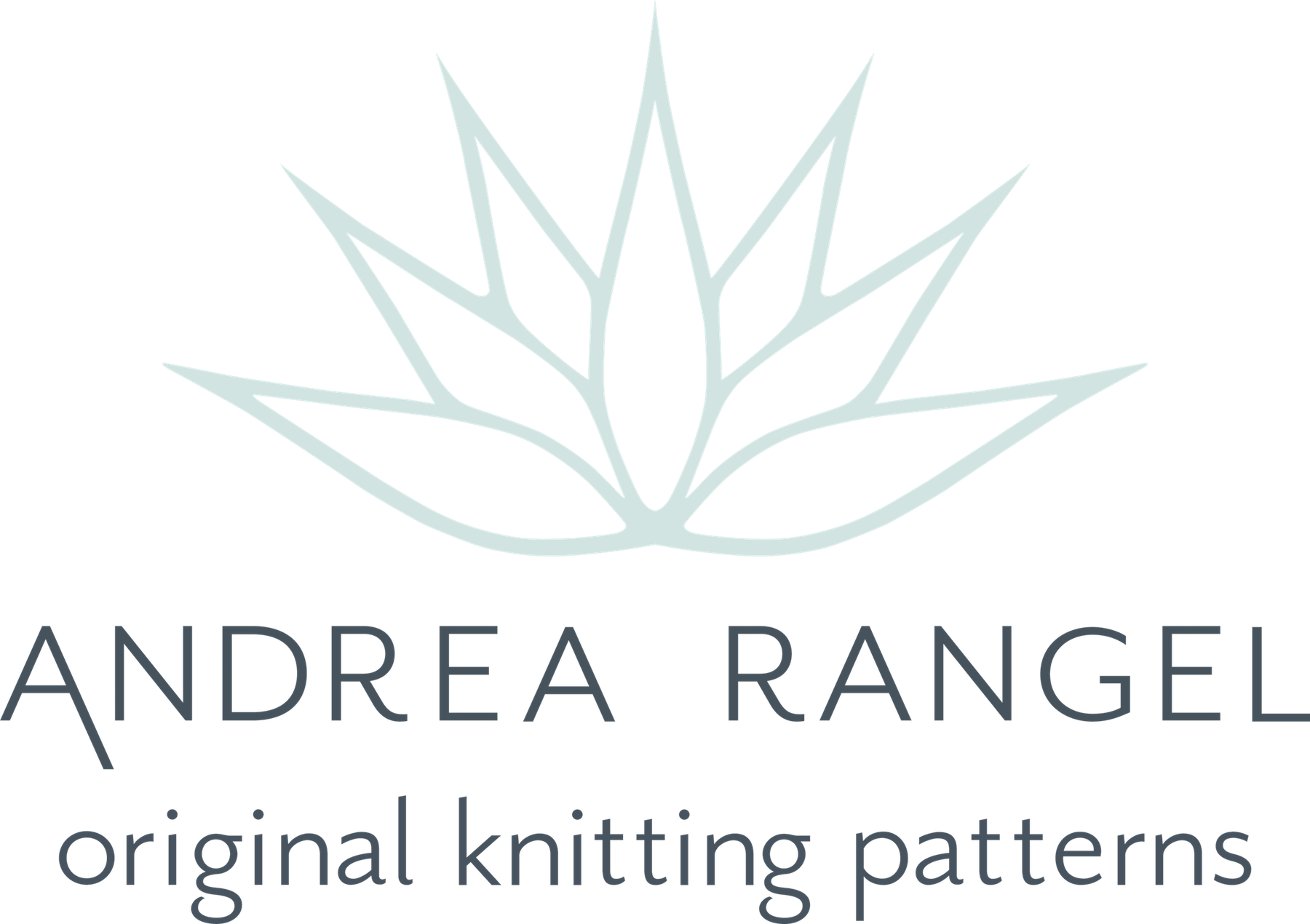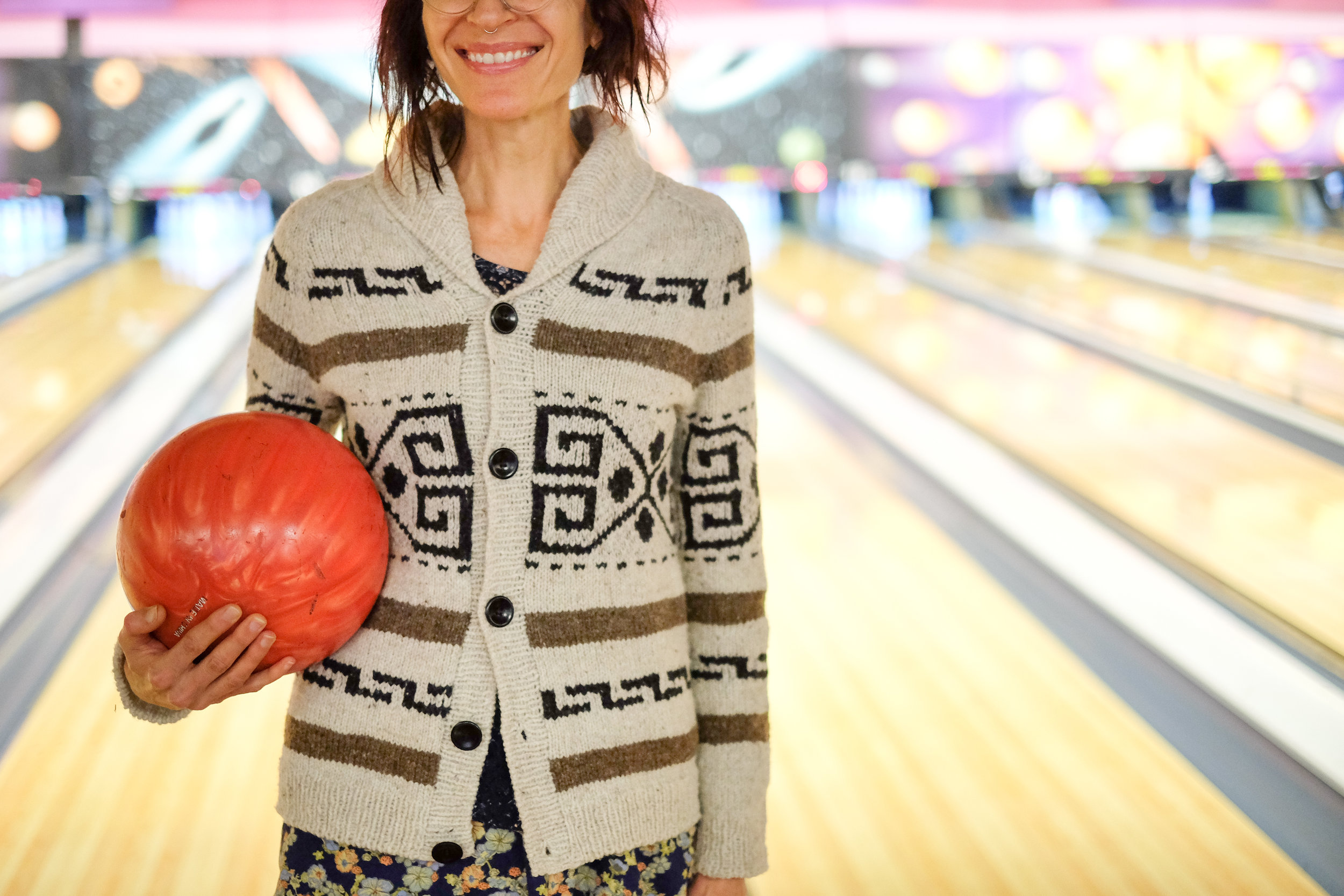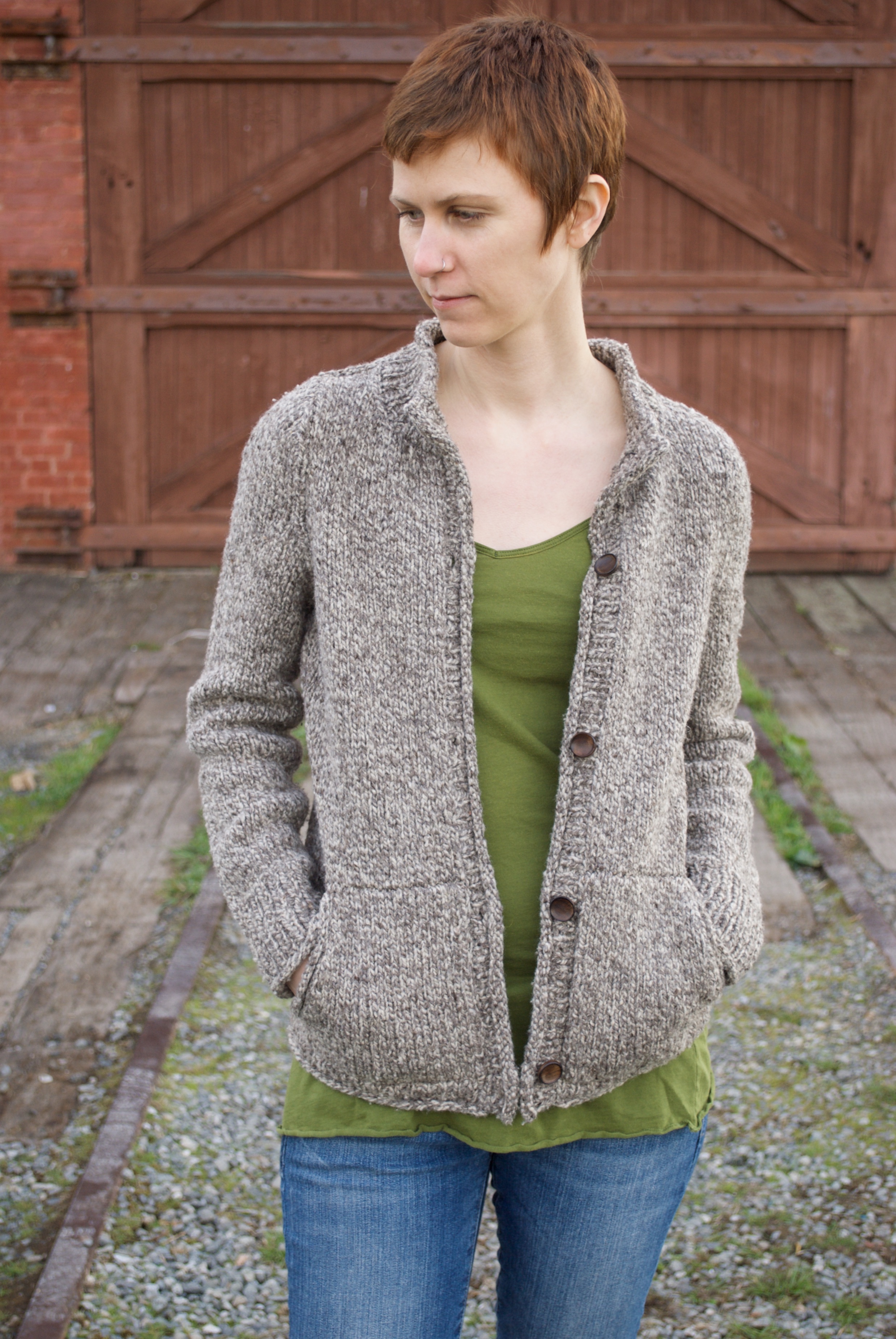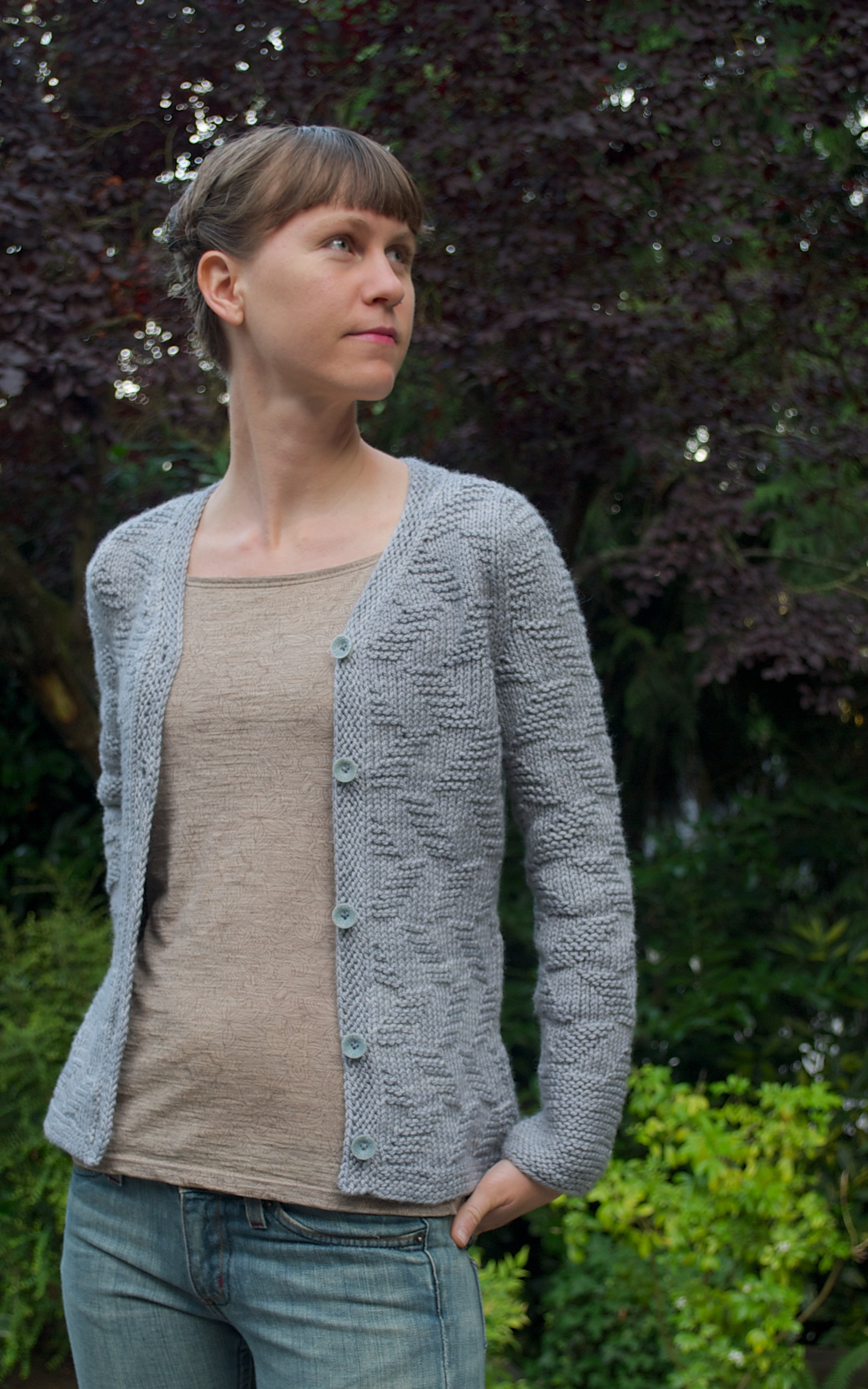Hinterland Straits: Camber & Halyard
This week I'm going to interrupt my Rugged Knits pattern highlights to talk about two new patterns that I published as part of a collaboration with some fantastic BC designers and a great local yarn company. Hinterland yarns are totally Canadian, with alpaca fibre from alpacas right here in Victoria that blended with Canadian wool at an Alberta mill. The yarn is perfect for this region - woolen spun, rustic, warm, and soft. It blooms like nothing I've ever seen before and I'm totally smitten with it.

Photos by Hanahlie Beise, 2016
My designs for the collection are Camber, a sophisticated, textured vest, and Halyard, a very cozy cardigan with an enormous collar.
Both garments are worked in pieces. You can, of course, modify them to be worked seamlessly if you like, but here's why I, myself want seams:
- I often find it more relaxing to work smaller pieces. It means I don't have to keep track of quite as many "at the same time" instructions. This can be especially helpful if you're new to making garments.
- I like the portability of smaller pieces.
- I like the satisfaction of finishing each piece.
- Seams add stability and durability.
- I find mattress stitch to be pretty magical - it's so neat and beautiful!
A little more about each pattern:
CAMBER

This vest is worked bottom-up with subtle waist shaping, a deep V neckline, and short row shoulder shaping for a flattering fit. It's got a clean silhouette with simple garter edgings. It's intended to be worn fairly fitted, with 0-3 in/0-7.5 cm of ease - if you plan to wear it over heavier layers, I recommend rounding up the size you make.
I adore the Hinterland Range yarn for this, as it give gorgeous stitch definition, but with the slightest halo and a beautifully cohesive fabric. If you do want to substitute, you for a heavy worsted or aran weight yarn like Imperial Yarn Columbia or Cestari Traditional Collection 2 Ply. Since it's got seams for added stability I'd be super curious to see this in a semi-solid hand dyed yarn like Hazel Knits Cadence.
errata:
A kind knitter pointed out to me that there were a couple of numbers problems with the back neckline and the short row shoulder shaping. I've corrected those numbers, so the pattern on Ravelry is now correct. If you already have the pattern, here's a link to the full explanation of the errata.
Pattern Specs
Sizes and Finished Measurements
Bust Circumference: 32 (37, 39.25, 44.25, 48, 52.25, 56.5, 60.75) in/81.5 (94, 99.5, 112.5, 122, 132.5, 143.5, 154.5) cm
Intended to be worn with +0-3 in/0-7.5 cm of ease at bust; shown in size 32 in/81.5 cm with +1 in/2.5 cm of ease on model
Yarn
522 (603, 640, 721, 782, 852, 921, 990) yd/477 (551, 585, 659, 715, 779, 842, 905) m worsted weight yarn
Shown in Hinterland Range (50% Rambouillet Wool, 50% Alpaca; 198 yd/181 m per 112 g/4 oz skein); Color: Honey; 3 (4, 4, 4, 4, 5, 5, 5) skeins
Blocked Gauge
Gauge measurement should be taken after blocking.
17 sts/28 rows = 4 in/10 cm in Textured Garter Rib Pattern with larger needles
Needles & Notions
Needle sizes are recommendations only; always use needle size necessary to achieve given gauge.
US #4/3.5 mm 16 in/40 cm circular needle US #4/3.5 mm 40 in/100 cm circular needle US #7/4.5 mm needle
tapestry needle
three .75 in/2 cm buttons
Skills
working shaping in Garter Rib Pattern, short row shaping, increasing and decreasing, picking up stitches

This cardigan is worked in pieces from the bottom-up. The construction is simple, but it's got some really special details!
- The back hem is longer than the front and, when sewing up, the front and back hem are left split.
- The cuffs are extra long, and the second half of the cuff seams are worked inside out so that they don't show when you turn the cuffs up.
- The collar is super easy to work - it's just ribbing without any shaping. You can also button it in two different ways so that it crosses over the front or just folds down.
- The sleeve caps and armholes are different for the front and back, making for a great fit.
My yarn recommendations for Camber apply to this one too, so check above for substituting suggestions.
errata
On page 5, the Final Back stitch count should be 31 (33, 35, 35, 37, 37, 37, 37) sts.
Pattern Specs
Sizes and Finished Measurements
Bust Circumference: 35 (39, 43, 47, 51, 55, 59, 63) in/89 (99, 109, 119.5, 129.5, 139.5, 150, 160) cm including bands
Intended to be worn with +2-4 in/5-10 cm of ease at bust for standard fit; shown in size 34 in/86.5 cm with +3 in/7.5 cm of ease on model
Yarn
1253 (1397, 1540, 1683, 1826, 1970, 2113, 2256) yd/1146 (1277, 1408, 1539, 1670, 1801, 1932, 2063) m worsted weight yarn
Shown in Hinterland Range (50% Rambouillet Wool, 50% Alpaca; 198 yd/181 m per 112g/4oz skein)
Color: Truffle; 6 (7, 8, 8, 9, 10, 10, 11) skeins
Blocked Gauge
Gauge measurement should be taken after blocking.
18 sts/26 rows = 4 in/10 cm in St st
Needles & Notions
Needle sizes are recommendations only; always use needle size necessary to achieve given gauge.
US #7/4.5 mm 32 in/80 cm circular needle (Project is worked in pieces so a circular needle isn’t required, but a circular needle will make working the collar and button bands more manageable.)
tapestry needle
seven .75 in/2 cm buttons
Skills
seaming (mattress stitch), picking up stitches, increasing and decreasing




